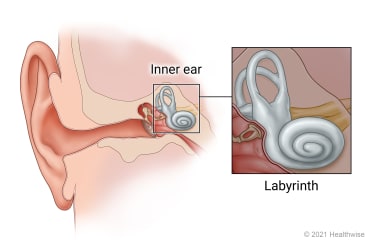
Your Care Instructions
Labyrinthitis (say "lab-uh-rin-THY-tus") is a problem deep inside your inner ear. It happens when the labyrinth gets inflamed. That's the part of your inner ear that helps control your balance.
The problem may cause vertigo. Vertigo makes you feel like you're spinning or whirling. You may feel sick to your stomach or vomit. You may lose your hearing for a while. Or you may have a ringing sound in your ears.
Most of the time, labyrinthitis goes away on its own. This often takes several weeks.
If the problem is caused by bacteria, your doctor will give you antibiotics. But most cases are caused by a virus. A virus can't be cured with antibiotics.
Your doctor may give you medicines to help control the nausea and vomiting.
Follow-up care is a key part of your treatment and safety. Be sure to make and go to all appointments, and call your doctor if you are having problems. It's also a good idea to know your test results and keep a list of the medicines you take.
How can you care for yourself at home?
- Try bed rest and keeping your head still for the first few days you have vertigo. This may help the vertigo and reduce nausea and vomiting.
- Return to your normal activities if vertigo lasts more than a few days. This may be hard, but it usually helps your brain adapt to the vertigo more quickly. As your brain adapts, vertigo will slowly go away.
- Do what you can to prevent falls. For example, keep your home uncluttered, and use nonskid mats around your house and in your bath. Vertigo makes you more likely to fall.
- Try balance exercises for vertigo if your doctor suggests it. An example is to stand with your feet together, arms at your sides. Hold this position for 30 seconds.
- Do the Brandt-Daroff exercise if your doctor suggests it. It may help your brain adapt to vertigo.
- Sit on the edge of your bed or sofa.
- Quickly lie down on one side.
- Stay in this position until the vertigo goes away or for at least 30 seconds.
- Sit up. If this causes vertigo, wait for it to stop.
- Do the exercise on the other side.
- Repeat these steps 10 times. Do the exercise 2 times a day until the vertigo is gone.
- Take your medicines exactly as prescribed. Call your doctor if you think you are having a problem with your medicine.
- If your doctor prescribed antibiotics, take them as directed. Do not stop taking them just because you feel better. You need to take the full course of antibiotics.
When should you call for help?
Call 911 anytime you think you may need emergency care. For example, call if:
- You passed out (lost consciousness).
- You have symptoms of a stroke. These may include:
- Sudden numbness, tingling, weakness, or loss of movement in your face, arm, or leg, especially on only one side of your body.
- Sudden vision changes.
- Sudden trouble speaking.
- Sudden confusion or trouble understanding simple statements.
- Sudden problems with walking or balance.
- A sudden, severe headache that is different from past headaches.
Call your doctor now or seek immediate medical care if:
- You have new or worse dizziness.
- You notice changes in your hearing.
Watch closely for changes in your health, and be sure to contact your doctor if:
- You have new or worse nausea or vomiting.
- Your vertigo gets worse.
- Your vertigo has not gotten better in 2 weeks.
Where can you learn more?
Go to http://www.healthwise.net/patientEd
Enter U094 in the search box to learn more about "Labyrinthitis: Care Instructions".
Current as of: October 27, 2024
Author: Ignite Healthwise, LLC Staff
Clinical Review Board
All Healthwise education is reviewed by a team that includes physicians, nurses, advanced practitioners, registered dieticians, and other healthcare professionals.

